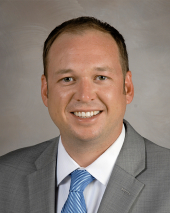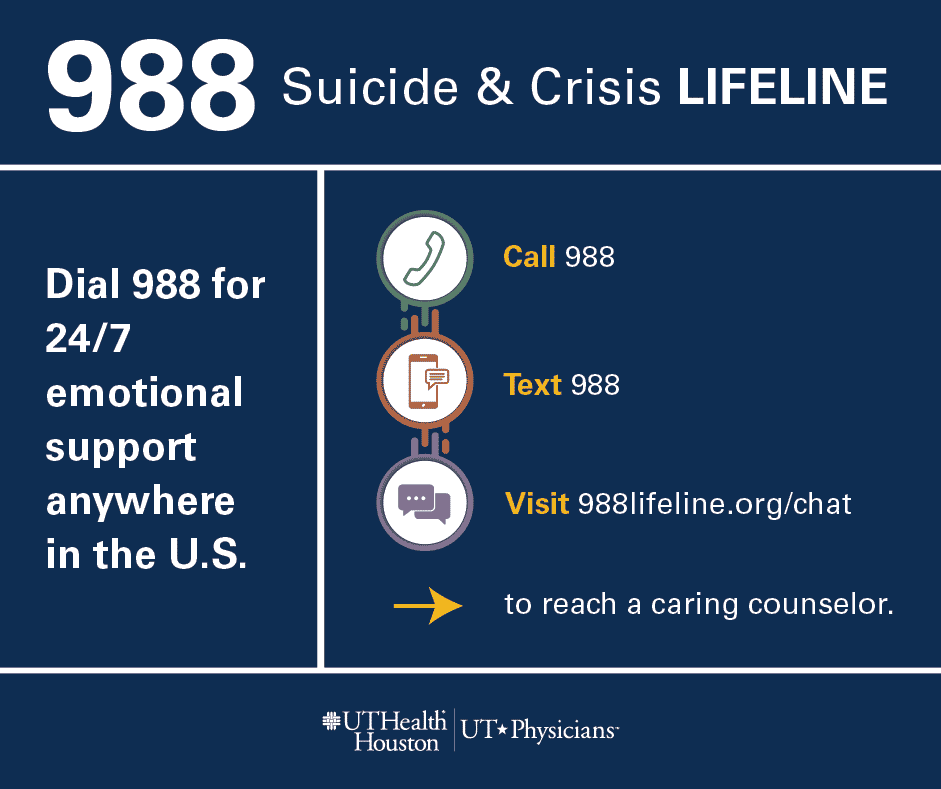On July 16, the U.S. rolled out the 988 Suicide and Crisis Lifeline. Similar to the 911 emergency line, a person can now dial 988 any time or day to receive help during a mental health crisis.

Mental health and behavioral health specialists have anticipated this hotline for the past two years, according to Bobby R. Nix, MD, psychiatrist and vice chair of clinical affairs with UT Physicians Psychiatry Outpatient Clinic and director of UT Physicians Behavioral Health Outpatient Services for McGovern Medical School at UTHealth Houston.
“In 2020, Congress passed a national, three-digit hotline after noticing a rise in suicides, substance abuse, and other mental health issues that COVID helped exacerbate. Funding for this type of support has increased since then,” Nix said. “By enacting this new hotline, our lawmakers recognized that everyone should have access to emergency emotional support 24 hours a day, seven days a week.”
The new 988 number offers several benefits to the public.
“First, it’s only three digits. It’s much easier than the 10-digit number of the National Suicide Prevention Lifeline. People don’t have to program an 800 number in their phones or keep it somewhere in their wallet to call it,” Nix said.
Additionally, callers will bypass the 911 system.
“People who didn’t know about the suicide line were calling 911 for mental health-related problems. This was overloading the 911 system because talking to someone in a suicidal or addiction crisis can take a long time,” he said. “Now these calls are going to be answered by people who are specially trained to help someone in emotional distress, and they’ll listen and assist for as long as necessary.”
The 988 hotline may also help reduce the number of involuntary hospitalizations.
“Sometimes when people would call 911, the only option for dispatchers was to send out police who would take patients to the hospital involuntarily. These types of incidents may have kept people from reaching out for help again when they needed it,” Nix said. “The 988 number has trained mental health specialists that can de-escalate situations and connect patients with the appropriate level of treatment for their situation, which doesn’t always mean inpatient hospitalization.”

People who prefer to not speak can still correspond on the 988 system.
“Different people and generations have different comfort levels when talking to people they don’t know. People can text 988 and communicate that way, or they can get on the internet and use the chat feature,” Nix said.
Those who are hearing impaired can text, chat, or dial 711 to reach the TTY relay service, he added.
Regardless of how one chooses to communicate, the doctor encourages anyone in distress to reach out.
“People didn’t talk about mental health for a long time because they were afraid of the stigma,” Nix said. “Mental illness is real, and when something becomes concerning, it’s important to get help. Anyone suffering from something highly traumatic — it doesn’t just have to be suicide — can now access free emergency help.”
For more 988 information or answers to FAQ, visit the 988 Suicide & Crisis Lifeline and Substance Abuse and Mental Health Services Administration websites.


